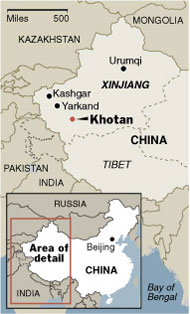How does one reconcile the governmental promotion of atheism in a society with strongly entrenched religious beliefs and customs? The Chinese communist government has tried to square this circle for years now, and the Xinjiang Province's Uighur Muslim majority has proven its greatest challenge. Edward Wong of the New York Times explores this societal conflict and reports on the most recent Chinese government efforts to control and undermine Xinjiang's Uighur Muslims. 
Here is a portion of Wong's article where he discusses rising Chinese government attempts to restrict Islamic practices in Xinjiang, emphasizing that a more serious ‘crackdown’ may be in the works:
Many of the rules have been on the books for years, but some local governments in Xinjiang have publicly highlighted them in the past seven weeks by posting the laws on Web sites or hanging banners in towns.
Those moves coincided with Ramadan, which ran from September to early October, and came on the heels of a series of attacks in August that left at least 22 security officers and one civilian dead, according to official reports. The deadliest attack was a murky ambush in Kashgar that witnesses said involved men in police uniforms fighting each other.
The attacks were the biggest wave of violence in Xinjiang since the 1990s. In recent months, Wang Lequan, the long-serving party secretary of Xinjiang, and Nuer Baikeli, the chairman of the region, have given hard-line speeches indicating that a crackdown will soon begin.
Mr. Wang said the government was engaged in a "life or death" struggle in Xinjiang. Mr. Baikeli signaled that government control of religious activities would tighten, asserting that "the religious issue has been the barometer of stability in Xinjiang."
Anti-China forces in the West and separatist forces are trying to carry out "illegal religious activities and agitate religious fever," he said, and "the field of religion has become an increasingly important battlefield against enemies."
The Chinese government does indeed face a violent threat from extremist elements in Xinjiang and from foreign sources who support the province's muslims, but these crackdowns and rules targeting Uighurs are mainly imposed to further expand the government's rule over the region. Wong details the government's efforts in controlling Uighurs’ Hajj to Mecca and Ramadan practices, both sacred rights for all Muslims. The Chinese government fears the spread of Islamic radicalization and separatist motivations and organizations, and both of these they believe can be combatted if they strengthen their control over the Xinjiang region and its people. That is why the government has been importing Han Chinese into the region in great numbers, diluting the Uighur majority and their cultural and societal norms, and building infrastructure, specifically railways, which connect the region to Central Asia and more importantly, to eastern China.
How successful do you think the Chinese government's anti-religious and anti-Uighur custom laws have been and will be? Are these measures, some quite oppressive and restrictive, more likely to sow a more governable and stable state for the Chinese government or are they more likely to foment greater amounts and degrees of radicalization and separatist feelings and actions? What would a McCain or Obama administration policy be towards the Chinese government's treatment and efforts in Xinjiang?
(Photo Source: New York Times)